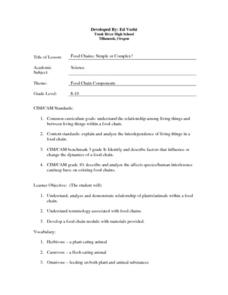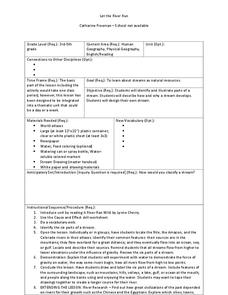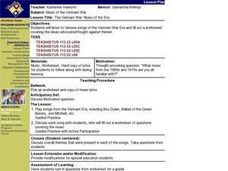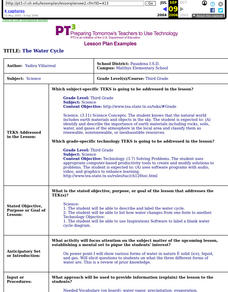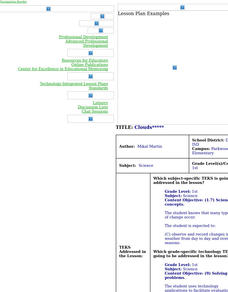Curated OER
Teaching About Simple Machines
Students identify six different simple machines. They investigate the difference between the ideal and actual mechanical advantage. Students calculate the actual mechanical advantage for several simple machines.
Curated OER
Plants, Ecology, Seed Planting
First graders use senses to examine objective or events, then gather and interpret data with instruments. They design invention to support or refute hypothesis, then generate, record, and organize data. They improve environmental...
Curated OER
Food Chains: Simple or Complex?
Students explore the relationships within the food chain between plants and animals. They construct modules of food chains, keeping them simple and not complex. They focus on what the animals eat and not on what eats it.
Curated OER
Composting
Using 2-liter bottles, junior ecologists create composting tubes in which they place nitrogen-rich and carbon-rich materials. They observe what changes occur over two weeks' time. Provide more specific direction to your class as to what...
Curated OER
Brainstorming and Creating a Graphic Organizer Using Kidspiration
Although focused on the winter ecology at Crater Lake, this lesson could be tweaked to use as a exploration of any region. After a visit to Crater Lake, learners discuss topics relating to winter in this area, such as the behavior of...
Curated OER
Water Filtration
Learners demonstrate the four of five procedures that municipal water plants use to purify water for drinking. A water filtration system is designed by a student and their partner. A data chart is made to record all observations when the...
Curated OER
5 Types of Chemical Reactions and a Lab on Mole
Students recognize the concepts of the five general types of chemical reaction: combination, decomposition, single replacement, double replacement and combustion. They practice classifying chemical equations and determine the moles in a...
Curated OER
Let the River Run
Learners explore the environment by reading a story in class. In this water formation lesson, students define environmental terms such as rivers, streams, gulf, oceans and lakes. Learners read the story A River Ran Wild and discuss the...
Curated OER
Looking at Leaves Lesson 1
Fourth graders visit an outdoor area and compare/contrast two different leaves using Venn diagrams. They create tree leaf rubbings from their leaves and examine their vein structures or needle patterns.
Curated OER
Soil Nutrients - Phosphorus Lab Lesson Plan
Students list sources of phosphorus in soil. They explain how phosphorus is removed from the soil and used by plants. Students list the symptoms of insufficient or excess phosphorus. Students perform experiments to examine the effect of...
Curated OER
Vegetation Scavenger Hunt
Pupils use picture cards to familiarize themselves with plant structures and characteristics. They collect plant specimens without destroying the plant and mount them creating a class herbarium.
Curated OER
How Cells Reproduce
Students explain why cells reproduce and draw a diagram of each of the stages in mitosis. They put the stages of mitosis (interphase, prophase, metaphase, anaphase, telophase, and cytokinesis) in the correct sequence, from the beginning...
Curated OER
The Vietnam War: Music of the Era
Students listen to famous songs of the Vietnam War Era. They complete a worksheet covering the ideas advocated/fought against therein.
Curated OER
Talking Trash
Define vocabulary related to global waste. Creative thinkers review and illustrate terms for the Global Garbage Picture Dictionary. They play a vocabulary game in which co-operative skills among players in encouraged. A great way to...
Curated OER
Air Pollution and Asthma (11th Grade)
What is the air quality index? Start by discussing pollution and air quality with your budding environmentalists. A list of instructional activities are provided here from inviting a guest speaker into your classroom to discussing...
Learning to Give
Start Cleaning the Air
Advocate for the environment! With the short story included, learners are prompted to think about radon (the odorless and colorless gas) and possible ways to get donations or raise money to purchase detection equipment. The plan spans...
Curated OER
Measure It Up!
Students investigate the states that water may take. In this physical science lesson, students read the book, Water: Up, Down, and All Around and recall the states of water from the book. Students examine how water takes the shape of its...
Curated OER
History of the X-Ray
Seventh graders discuss the history of the x-ray machine. For this social science lesson, 7th graders understand how a x-ray machine works. Students recognize that there have been many improvements to the x-ray machine over the...
Curated OER
Ink Analysis and Thin Layer Chromatography
Students explain the process of TLC. They identify at least three components of ink. They analyze data and make conclusions based on laboratory observations.
Curated OER
DNA AND BLOOD TYPING
Students list three descriptive characteristics and three functions of DNA, describe two ways that genetics is important in a forensic investigation, and list the four major human blood types.
Curated OER
The Water Cycle--Using Inspiration Software
Third graders describe and label the water cycle, and list how water changes from one form to another; students use Inspiration Software to label a blank water cycle diagram.
Curated OER
Clouds
First graders create a PowerPoint presentation and identify three types of clouds; cirrus, stratus and cumulus. In addition, 1st graders construct their own type of cloud during a hands-on activity.
Curated OER
Philanthropic Behavior/ Cooperative Learning
Students increase listening comprehension and use critical thinking skills to make a picture. In this philanthropic behavior lesson, students draw pictures in three parts. Each part is drawn by another students. Students share their...
Curated OER
Water Cycle (Grades 2-4)
Students demonstrate their understanding of the water cycle and how it effects the environment by graphically depicting and describing the water cycle.


